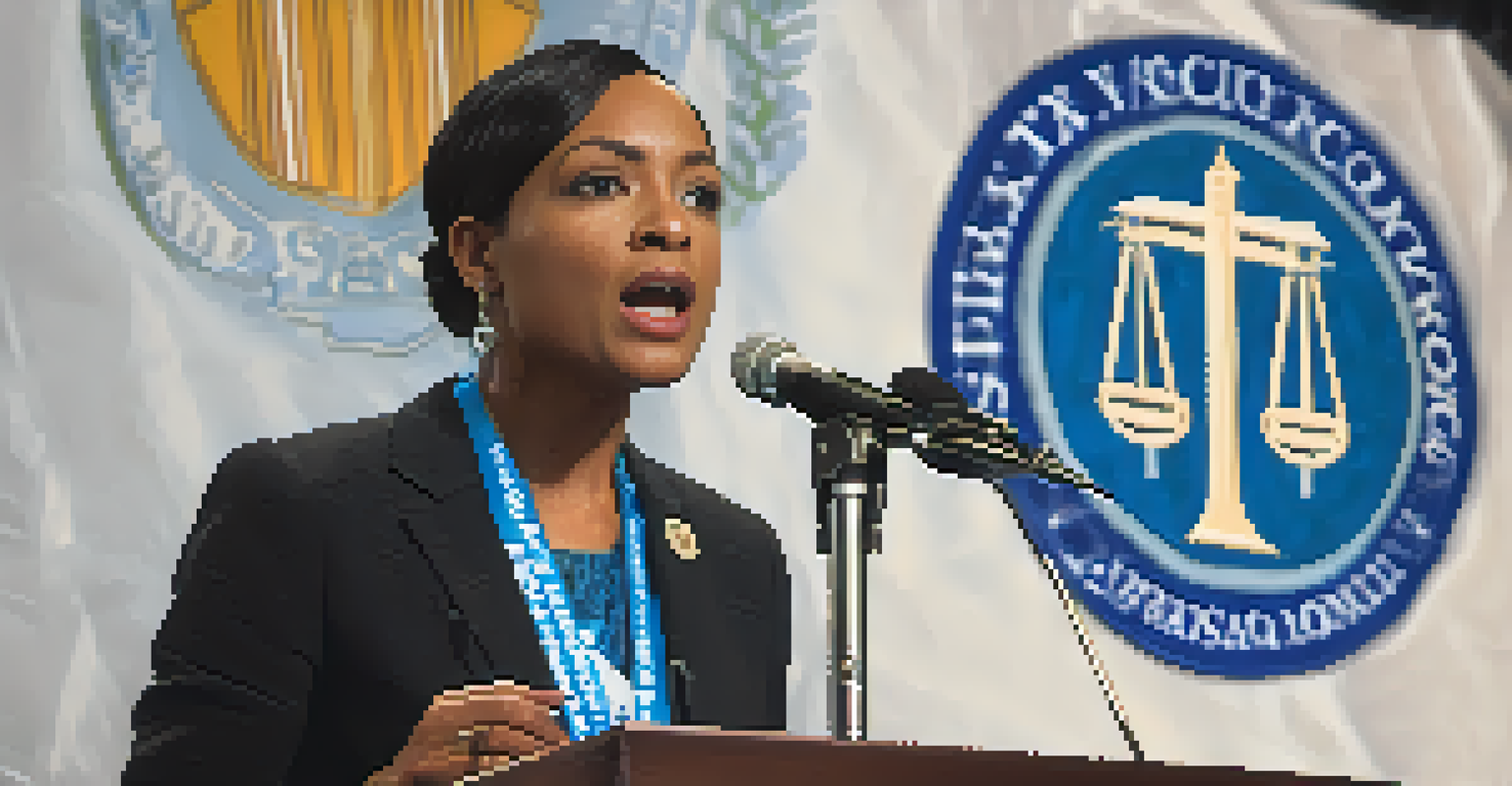Impact of San Francisco's City Council on Local Policies

Understanding San Francisco's City Council Structure
San Francisco's City Council, known as the Board of Supervisors, plays a pivotal role in local governance. Comprised of 11 members, each representing a distinct district, the board is responsible for enacting laws and policies that affect daily life in the city. This structure ensures that diverse community voices are heard, allowing for a representation that reflects the city's unique demographics.
A community is like a ship; everyone ought to be prepared to take the helm.
Each supervisor serves a four-year term, and the council operates under a system of checks and balances. This means no single member can unilaterally impose policies, fostering collaboration and debate. Consequently, decisions made often come from extensive discussions, ensuring that a range of perspectives is considered.
Moreover, the city council's structure allows for specialized committees that focus on specific issues, such as housing or public safety. These committees dive deep into the details, shaping well-informed policies that can address the complexities of urban life in San Francisco.
Key Policies Shaped by the City Council
The City Council has a significant impact on various local policies, particularly in areas like housing, transportation, and public health. For instance, the council has implemented measures to promote affordable housing, recognizing the city's ongoing housing crisis. These efforts might include rent control policies or incentives for developers to include affordable units in new buildings.

Transportation policies are also a significant focus, with the council working to improve public transit and reduce traffic congestion. Initiatives such as bike-sharing programs and expanded bus routes highlight the council's commitment to sustainable transportation options that benefit residents.
City Council's Role in Local Policy
San Francisco's City Council, comprising 11 members, plays a crucial role in shaping diverse local policies to address community needs.
Public health is another crucial area where the council's influence is felt, especially evident during the COVID-19 pandemic. The board's swift decisions regarding health mandates and resources showcased its ability to respond to urgent public needs, ultimately shaping the city's approach to health crises.
The Role of Public Input in Policy Development
Public input is vital to the policy-making process in San Francisco, as the City Council actively encourages community engagement. Regular public hearings allow residents to voice their opinions and concerns on proposed legislation, ensuring that policies reflect the community's needs. This level of engagement fosters a sense of ownership among residents regarding local governance.
The best way to predict the future is to create it.
Additionally, the council often collaborates with local organizations and advocacy groups to gather insights and feedback on specific issues. This partnership not only enriches the policy-making process but also empowers community members to take an active role in shaping their environment.
The City Council's commitment to transparency is evident in its efforts to provide accessible information about policy proposals and decisions. By making this information available, they help demystify the governance process, encouraging more residents to participate and stay informed.
The Impact of San Francisco's City Council on Social Issues
Social issues, such as homelessness and inequality, are at the forefront of San Francisco's policy discussions, heavily influenced by the City Council. The council has implemented various initiatives aimed at addressing homelessness, from funding shelters to creating supportive housing programs. These multifaceted approaches reflect the complexity of the issue and the council's commitment to finding sustainable solutions.
Moreover, the council has championed policies aimed at reducing racial and economic disparities within the city. This includes initiatives that promote equity in education and job opportunities, ensuring that all residents have access to the resources they need to thrive.
Public Engagement in Governance
The City Council actively encourages public input through hearings and collaborations, fostering a sense of community ownership in policy-making.
By focusing on social issues, the City Council demonstrates its understanding of the interconnectedness between policy and community well-being. This holistic approach not only addresses immediate concerns but also aims to create a more equitable and inclusive city for future generations.
Challenges Faced by the City Council in Policy Implementation
Despite its crucial role, the City Council faces several challenges in policy implementation. One significant hurdle is the tension between development and community preservation, particularly in a city known for its unique neighborhoods. Balancing the need for new housing and infrastructure with the desire to maintain the character of these communities can be a contentious process.
Political polarization can also complicate decision-making within the council. With varying ideologies among supervisors, reaching consensus on critical issues can be difficult, sometimes leading to stalled initiatives or watered-down policies. This dynamic underscores the need for effective communication and collaboration among council members.
Additionally, funding constraints often limit the council's ability to implement ambitious policies. Limited budgets can result in tough choices about which initiatives to prioritize, sometimes leaving important issues unaddressed. This financial reality requires the council to be strategic in navigating both community needs and available resources.
Recent Legislative Achievements of the City Council
In recent years, the City Council has celebrated several legislative achievements that reflect its commitment to improving life in San Francisco. One notable success is the passage of the 'Care Not Cash' initiative, which reallocates funds from cash assistance programs to services aimed at addressing homelessness. This approach has garnered both support and criticism, showcasing the complexities of social policy.
Another significant achievement is the approval of the 'Housing for All' plan, which aims to streamline the approval process for affordable housing projects. By reducing bureaucratic red tape, the council hopes to expedite the construction of much-needed housing units, helping to alleviate the housing crisis.
Challenges in Policy Implementation
The City Council faces significant challenges, including funding constraints and balancing development with community preservation, which complicate effective policy execution.
These legislative successes highlight the City Council's ability to respond to pressing issues while navigating the challenges inherent in urban governance. Each achievement is a step toward creating a more livable city, emphasizing the importance of adaptive and responsive leadership.
Future Directions for San Francisco's City Council Policies
Looking ahead, the City Council faces pressing challenges that will shape its future policies. Climate change, for instance, is a significant concern that demands proactive measures. The council is expected to focus on sustainability initiatives, such as promoting green energy and enhancing public transportation options to reduce the city’s carbon footprint.
Housing remains a top priority, with the council likely to explore innovative solutions to address the ongoing crisis. This could involve expanding zoning laws to allow for more multifamily units or incentivizing the development of affordable housing through public-private partnerships.

Lastly, as social justice movements continue to gain momentum, the City Council may further prioritize policies aimed at equity and inclusion. By addressing systemic inequalities, the council can work toward a more just and equitable San Francisco, ensuring that all voices are heard and valued in the decision-making process.